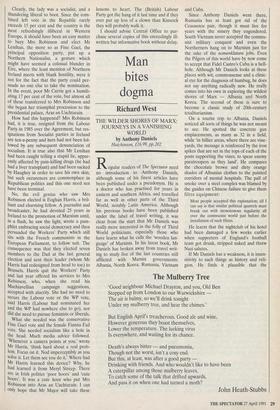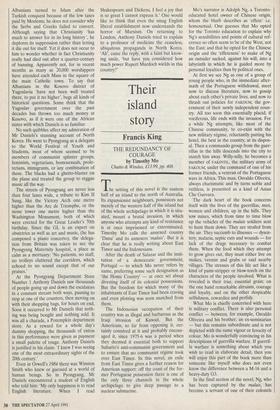Man bites dogma
Richard West
THE WILDER SHORES OF MARX: JOURNEYS IN A VANISHING WORLD by Anthony Daniels Hutchinson, £16.99, pp.202 Regular readers of The Spectator need no introduction to Anthony Daniels, although some of his finest articles have been published under a pseudonym. He is a doctor who has practised for years in eastern and southern Africa, and travelled far as well in other parts of the Third World, notably Latin America. Although his previous books have been published under the label of travel writing, it was clear from the start that Mr Daniels was really more interested in the folly of Third World politicians, especially those who have learnt what he calls the 'wooden lan- guage' of Marxism. In his latest book, Mr Daniels has broken away from travel writ- ing to study five of the last countries still afflicted with Marxist governments: Albania, North Korea, Rumania, Vietnam and Cuba.
Since Anthony Daniels went there, Rumania has at least got rid of the Ceausescu pair, though it must live for years with the misery they engendered. South Vietnam never accepted the commu- nist military conquest and even the Northerners hang on to Marxism just for the sake of the nomenklatura jobs. Even the Pilgers of this world have by now come to accept that Fidel Castro's Cuba is a hell- hole. Although Mr Daniels looks at these places with wit, commonsense and a clinic- al eye for the diagnosis of humbug, he does not say anything radically new. He really comes into his own in exploring the wildest shores of Marx — Albania and North Korea. The second of these is sure to become a classic study of 20th-century totalitarianism.
On a tourist trip to Albania, Daniels noticed all sorts of things he was not meant to see. He spotted the concrete gun emplacements, as many as 32 in a field, while 'in hillier areas, where there are vine- yards, the message is reinforced by the iron spikes that are set in the tops of each of the posts supporting the vines, to spear enemy paratroopers as they land'. He compares the chocolate brown and dirty orange shades of Albanian clothes to the painted corridors of mental hospitals. The pall of smoke over a steel complex was blamed by the guides on Chinese failure to give them filtre equipment: Most people accepted this explanation; all I can say is that similar political quarrels must break out with monotonous regularity all over the communist world just before the installation of such filtres.
He learnt that the nightclub of his hotel had been damaged a few weeks earlier when supporters of England's football team got drunk, stripped naked and threw Nazi salutes.
If Mr Daniels has a weakness, it is insen- sitivity to such things as history and reli- gion. He finds it plausible that the Albanians turned to Islam after the Turkish conquest because of the low taxes paid by Moslems; he does not consider why the Serbs and Greeks failed to convert. Although saying that Christianity `has much to answer for in its long history', he deplores its suppression rather than letting it die out for itself. Yet it does not occur to him to wonder whether in fact Christianity really had died out after a quarter-century of banning. Apparently not, for in recent months as many as 20,000 worshippers have attended each Mass in the square of the main Catholic town. To say that Albanians in the Kosovo district of Yugoslavia `have not been well treated there, to put it no higher', begs all kinds of historical questions. Some think that the Yugoslav government over the past decades has thrown too much money at Kosovo, as if it were one of the African states with which Daniels is so familiar.
No such quibbles affect my admiration of Mr Daniels's stunning account of North Korea. He went to Pyongyang as a delegate to the World Festival of Youth and Students, most of whom seemed to be members of communist splinter groups, feminists, vegetarians, homosexuals, prole- terians, immigrants, or any combination of these. The blacks had a ghetto-blaster on the plane and treated the group to reggae music all the way.
The streets of Pyongyang are never less than four lanes wide, a tribute to Kim II Sung, like the Victory Arch one metre higher than the Arc de Triomphe, or the stone tower one metre higher than the Washington Monument, both of which were erected for the Great Leader's 70th birthday. Since the GL is an expert on obstetrics as well as art and music, (he has composed a piano concerto), the delega- tion from Britain was taken to see the Pyongyang Maternity hospital, a place as calm as a mortuary: 'No patients, no staff, no trolleys cluttered the corridors, which echoed to no sound except that of our praises.'
At the Pyongyang Department Store Number 1 Anthony Daniels saw thousands of people going up and down the escalators in a constant stream both ways, pausing to stop at one of the counters, then moving on with their shopping bags, for hours on end. Soon it occurred to Mr Daniels that noth- ing was being bought and nothing sold. It was all a charade, a Potempkin department store. As a reward for a whole day's dummy shopping, the thousands of extras in this performance were given as payment a small palette of rouge. Anthony Daniels is justified in his claim: 'I knew I was seeing one of the most extraordinary sights of the 20th century.'
Even in Orwell's 1984 there was Winston Smith who knew or guessed at a world of human beings. So in Pyongyang, Mr Daniels encountered a student of English who told him: 'My only happiness is to read English literature. When I read Shakespeare and Dickens, I feel a joy that is so great I cannot express it.' One would like to think that even the smug English liberal establishment now understands the horror of Marxism. On returning to London, Anthony Daniels tried to explain to a professor of medicine the ceaseless, ubiquitous propaganda in North Korea. `Ah', came the reply, with a faint but know- ing smile, 'but have you considered how much power Rupert Murdoch wields in this country?'



















































 Previous page
Previous page